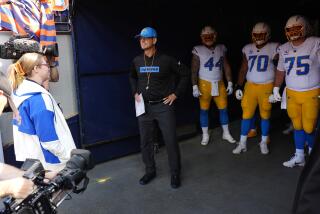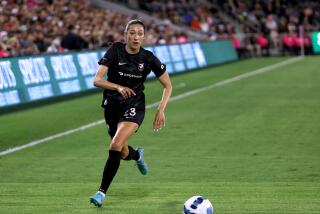DOGGED DETERMINATION
- Share via
NEW YORK — Before Pat LaFontaine knew his hockey career was in jeopardy, before anyone could explain why he felt so listless and empty, his dog, Fred, knew something was amiss.
LaFontaine had suffered concussions before, but none affected him like the blind-side hit from Pittsburgh forward Francois Leroux that sent him crashing to the ice in October 1996. The blow to the right side of his head changed his personality from perpetual cheer to deep gloom and left him wandering around his Buffalo home in a daze, his head aching and his thoughts jumbled. He tried to play again but was too disoriented, and no one knew why.
Determined not to alarm his wife and children, he struggled to put up a good front. Only Fred, it seemed, felt his fear and confusion.
“I’d wake up every two or three hours and go into different rooms in the house, and he followed me to every room,” LaFontaine said. “I’m going through all this emotional stuff and he knew. I’d get up in the morning and he’d be right there. I’d go lie down and he was there. Animals sense things too.”
The dog’s instincts were uncannily correct. Doctors in Buffalo, where LaFontaine had been an all-star in five of his six seasons with the Sabres, told him he had a severe case of post-concussion syndrome. If he played again, chances were high he’d suffer another and more debilitating head injury.
They didn’t order him to quit, but their message was obvious. He had nothing to prove, they told him, not after coming back from major knee surgery to score 40 goals and 91 points in the 1995-96 season. Why push your luck?
He was almost ready to agree.
“Up until the end of April of last year, I was saying, ‘Why do you want to go back? You’ve had a nice career. You’ve enjoyed a lot of things. You can go on and do other things,’ ” he said. “But I asked myself, ‘If you have the passion and drive, why not? You know there are still things you want to be a part of. You had hopes of being an Olympian again, after winning the World Cup in ’96 and being an Olympian at 18.’ I went to the Stanley Cup finals my first year [with the New York Islanders] and it would be a dream come true to be part of that again. And there are a few personal milestones I’d like.
“It was funny. When Derek Plante scored that overtime goal against Ottawa [to win the Sabres’ first-round playoff series], that’s when I felt I wanted to play. It just reconnected. It was a sense of everything’s familiar.”
Everything is familiar again--and happily so.
LaFontaine is again setting up his linemates with clever passes, darting into holes to score crucial goals. He leads the team with 20 and is tied with Wayne Gretzky for the team scoring lead with 54 points--including the 1,000th of his career, the third American-born player to reach that milestone. He goes to the net without hesitation, standing up to punishment inflicted by such brawny opponents as the Philadelphia Flyers and New Jersey Devils.
And he will be back in the Olympics next week at Nagano, 14 years after he played on the seventh-place U.S. team at Sarajevo. He will turn 33 on Feb. 22--also the day of the gold-medal game, which the U.S. is favored to reach.
The biggest difference in his life--and it was a major change--is he now plays for the New York Rangers, who face the Mighty Ducks tonight at Anaheim.
LaFontaine had a bitter parting with the Sabres, who assumed he would retire and didn’t invite him to training camp last September. Instead of getting into a fight they weren’t sure they wanted to win--General Manager Darcy Regier said the Sabres “could not allow him to play given the medical information we had”--they traded LaFontaine to the Rangers for a second-round draft pick. LaFontaine was a hero in Buffalo, beloved for his charity work, and the move was wrenching. However, he is too thankful for his improbable return to the NHL and the Olympics to harbor a grudge.
“We all think as athletes we’re somewhat invincible. OK, we get knocked around, but we get back up again. There’s control involved,” he said. “And when somebody takes away your basic control, whether it has to do with your emotions or something physical, no matter who you are, you’re vulnerable. You realize you don’t have as much control as you think.
“Things that might have frustrated me or gotten me down before, they don’t bother me anymore. I have a different perspective. I just say life’s too short to worry about it, whether it’s my kids or hockey or whatever.”
In doing research on head injuries, he learned that even though doctors said he had no permanent brain damage, he might be four to six times more susceptible to another concussion than players who never had one. Armed with a specially padded helmet and a mouthpiece, he accepts the increased peril with equanimity. “The helmet and mouth guard definitely have helped, and so has the time off, giving my head a chance to recover,” he said. “I feel I can go out and play my game and not worry.”
Yet, those who love him--or merely love his skillful, exuberant game--find it difficult to watch him without thinking what one more concussion might do.
His wife, Marybeth, urged him to retire. She had to deal with his moodiness and headaches while trying to explain to three inquisitive kids why their daddy was too sick to play with them. She had to restore a child’s faith when their 5-year-old daughter, Brianna, declared one day, “Jesus is mean. If he was nice he wouldn’t let my daddy hit his head.”
She was thinking only of his well-being, but he couldn’t have lived with himself if he hadn’t tried to play again.
“My wife had a lot of fears, but I told her everything is OK, even after I got hit a few times,” he said. “It comes back to the feeling of enjoyment because you’re doing something you love, no matter what it is. If you like to write, you like to golf, to water ski, to shop--if there’s something in life you like to do, how do you deal with it when someone says, ‘I’m taking it away from you. Maybe you’re at risk, and maybe not.’ Would you do it? It’s a personal choice. Maybe I would, and maybe you wouldn’t play hockey.
“She remembers what it was like last year, but she always said, ‘I’ll support whatever you do because I know it’s something you need to do and want to do.’ ”
Ranger Coach Colin Campbell’s reservations were more practical. He trusted the judgment of the club’s doctors, who examined LaFontaine thoroughly before the trade was consummated. Still, he questioned how LaFontaine, who is generously listed on the Rangers’ roster as 5 feet 10 and 182 pounds, would fit on a team that is among the smallest and oldest in the Eastern Conference. He also didn’t know if LaFontaine still had the skill that helped him score 40 or more goals seven times and 50 goals twice, production the Rangers urgently needed to fill the void left when Mark Messier signed with Vancouver as a free agent.
And Campbell wondered, with reason, if LaFontaine could succeed with a target virtually painted on his back.
“Right off the bat, players went at him hard, and you don’t blame them. That’s part of the game,” Campbell said. “If it’s tough on me as a coach, the opposing coach is not going to be sympathetic and back off. Pat has answered that question so far, and he’s also fought back, and I think our team has jumped in when it became excessive.
“Pat has driven to the net and has gone in traffic. You have to remember he had a serious knee injury, too, and he hadn’t played a lot of hockey in two years. . . . He had a quick start and then fell back a little bit, but that was to be expected. The excitement and everything was catching up. Then he started to see more of the ice and make plays that come with superstar status.”
A superstar in Buffalo, he’s more like a small gleam in the Ranger galaxy. That doesn’t bother him. The Rangers, with a 17-22-15 record have many problems, but LaFontaine isn’t one of them.
“He’s been a star every team he’s been on. He’s been the guy,” Campbell said. “When he came to [the Islanders] as a young guy, he displaced one of the top guys of all time, Bryan Trottier, who was on the down side. He went to Buffalo and he was the guy there, too, even with [Alexander] Mogilny and [Dominik] Hasek. He came here and he’s not the guy. We’ve got Mike Richter and Brian Leetch and the greatest player in the game point-wise, in Wayne Gretzky. He’s handled it well, accepting a little bit less ice time.”
What’s a slight reduction in ice time after facing the prospect of never getting any ice time again?
“I’ve been close to a lot of children who have been in more severe situations. I guess I look at the big picture a lot more,” LaFontaine said. “You go through what you have to go through, and you deal with it. Whatever problems I may have now are good problems when you’re comparing it to talking about health.
“I’m just enjoying having the opportunity to play and doing what I love to do. When I injured my knee, I knew there was a small chance, maybe 3%, that I couldn’t come back. I didn’t think I’d ever play again after this head injury. . . . I couldn’t be more excited to have been a part of the Olympics at 18 and now have an opportunity 14 years later. Knowing now what the Olympics are all about, with my professional experience, I’m definitely prepared.”
More to Read
Go beyond the scoreboard
Get the latest on L.A.'s teams in the daily Sports Report newsletter.
You may occasionally receive promotional content from the Los Angeles Times.







